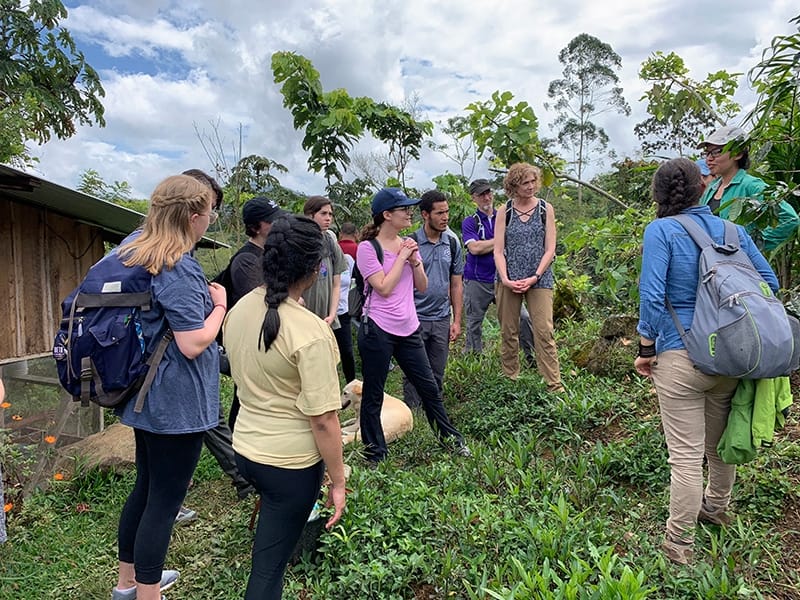Enlarge

It’s been a while since Dr. Sarah Easter (’06) was working on a master’s degree in business administration, but not so long that she doesn’t remember two specific classes, one in domestic consulting and one in international consulting.
“Those were my favorite classes,” Easter, an assistant professor in ACU’s Department of Management Sciences, said.
Remembering that experience, Easter worked with colleague Dr. Laura (Cleek ’88) Phillips, associate professor of management, to create a hands-on class that was socially focused. They came up with an elective course, Social Enterprise Consulting, which debuted in spring 2019. As part of this course, the two professors led a group of students on a Spring Break trip to Costa Rica, where they worked with a network of female entrepreneurs, Red de Emprendedoras del Turismo Sostenible de Turrialba or RETUS, to assist them in understanding the U.S. market for rural experiential tourism in Costa Rica.
The initial class was so successful that Easter and Phillips now are co-teaching a second iteration of the course and preparing students to take the same trip over spring break March 7-14.
“We are building on the consulting work the students completed last year,” Easter said.
The course, an elective that is open to all students who are at least juniors, is the perfect example of experiential learning that ACU emphasizes. That emphasis was highlighted in Fall 2019 when the new Center for Careers and Experiential Learning opened just inside the east entry to Brown Library.
The university’s focus on experiential learning helped ACU earn accolades from U.S. News & World Report for 2021. ACU was the highest-ranking university in Texas in the magazine’s new benchmark based on student success. Nationally, ACU achieved top 10 status in three of eight high-impact categories.
Enlarge

Kennedy Guerra and Riley Simpson are two of the latest students to benefit from that emphasis.
Kennedy, a global studies and Spanish major from Austin, is a veteran of international travel and understands the importance of experiential learning, especially in another culture.
“You become an ambassador for your country,” Kennedy said, “and it’s important to think about that.”
Riley, a management and marketing major from Dripping Springs, Texas, studied abroad in Germany in Fall 2019 and loved that experience. He met two students who went on the 2019 trip to Costa Rica, and they convinced him that he, too, would benefit from that experience.
“They were super excited I was going,” Riley said.
Enlarge

He is looking forward to learning about consulting with clients in a different country and culture. With an entrepreneurial spirit, Riley already has his own small media production company and will put his expertise in video and still photography to use on the Spring Break trip.
In Costa Rica, the students work with RETUS and Centro Agronomico Tropical de Investigacion y Ensenanza (CATIE).
CATIE is a university is dedicated to research and graduate education in agriculture and the management, conservation and sustainable use of natural resources. RETUS is an organization of female entrepreneurs focused on experiential rural tourism as a means of helping provide sustainable livelihoods in three Costa Rican communities.
The ACU class is helping RETUS better understand the U.S. market for experiential rural tourism in Costa Rica, and a certain amount of flexibility is required. The project they are tasked with in Costa Rica isn’t a nice, tidy assignment, Phillips noted.
“It changes as you go,” she said.
The class is divided into three segments – classroom preparation for the trip, the Costa Rica experience, and development of consulting deliverables for the client afterward. Topics covered in the classroom vary, among them serving in God’s work, experiential tourism, cultural context, and understanding and reaching target markets. The topics are designed to prepare students to be as effective as possible in their consulting assignment to support the female entrepreneurs.
After the trip to Costa Rica, the students spend the rest of the semester assessing their experience and preparing a final consulting project for the clients. The emphasis of the class is on experiential learning for the students, Easter and Phillips said, and that means turning out high quality deliverables.
“We want to ultimately deliver a great final project to their clients,” Easter said.
